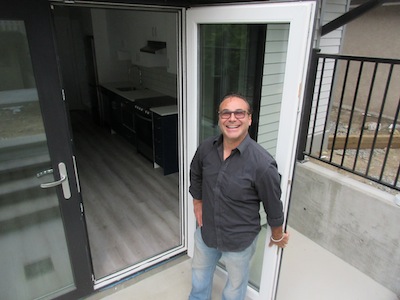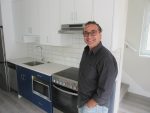Avie Estrin at Vancouver Yaffa Housing Society’s new laneway house. (photo by Pat Johnson)
Fred Dexall used to live in a group home in Kerrisdale. “I didn’t like it there,” he recalls. “The problem is they were very unfriendly. Everybody [kept] to themselves.”
When the Vancouver Yaffa Housing Society opened the first home for members of the Jewish community with mental health issues, in 2001, Dexall was the first resident. He remains there today.
“I’m happy here,” he said. There is more freedom to do one’s own thing than in the “dictatorial” group home he left, he said. Plus, the residents enjoy a Jewish lifestyle, celebrate the holidays, have Shabbat dinners on Fridays, attend the Bagel Club on Mondays and participate in other aspects of Jewish communal life. Every day, volunteers shuttle kosher meals from the kitchen at the Louis Brier Home and Hospital for Yaffa residents.
“Some of us have other disabilities besides mental illness,” said Drexall. “I have epilepsy and it’s all looked after.”
The organization is in the midst of a significant expansion. The house where Dexall has lived for 17 years is operated by Yaffa under a lease from the Vancouver Resource Society, a nonprofit providing accessible housing to people with disabilities, which owns the home in a quiet south Vancouver residential neighbourhood.
In 2010, Yaffa bought the house next door, welcoming more residents. Now, a sparkling new two-storey laneway house has just been completed behind the second home and renovations are taking place on the two houses to further increase capacity. Yaffa also has five units in a 51-unit building in Dunbar, which offers more intensive 24/7 care for residents. In an agreement with the Coast Foundation, B.C. Housing and the City of Vancouver, Yaffa has perpetual lease of these five spaces in return for funding a kosher kitchen in the facility.
Avie Estrin, the president of the society, is carrying on a family tradition. His parents, Aaron and Tzvia Estrin, were among the founding members of the Vancouver Yaffa Housing Society and Aaron was pivotal in raising the capital to launch the residential facility and purchase the second home. Their collective passion comes from firsthand recognition of the need. Avie Estrin’s brother, Marc, is a resident.
“I think it was front and centre for us because we had the awareness that many people – most people – simply aren’t privy to,” said Avie Estrin. “You see what people go through and the reality is, there was no other option. Remarkably, even though mental illness has been around forever, there was simply nothing in the Vancouver Jewish community to address it. Montreal had Jewish mental health housing facilities, Toronto had facilities. Vancouver had nothing.”
An ad hoc group of families came together to form the Vancouver Yaffa Housing Society, with no organizational support at the outset.
“We had to do something and it was meeting after meeting after meeting in somebody’s private home and, ultimately, they did make it happen,” said Estrin. “Once it got a little bit of momentum, then there was a little bit more attention. It got the ball rolling, but those first few years were very much uphill.”
Now, the facilities house 13 people. With the completed laneway house and upcoming renovations to the unfinished basement in the second house, the organization will welcome five more residents.
With 13 people in the south Vancouver homes, plus five in Dunbar, that makes 18, Estrin noted, “which is chai, which, again, is quite significant to us.”

Estrin said that, even with this expansion, the organization is only making a dent in the demand. With a rule of thumb that 10% of the population has a mental illness and half of those are acute, the Vancouver Jewish community, he estimates, probably has about 1,200 people who would meet Yaffa’s criteria for residency, which is based on DSM-IV Axis 1: “Schizophrenia, manic-depressive, things like that,” Estrin said.
He acknowledges the organization’s limits.
“We are doing what little we can,” he said, “and you might say, ‘well, it’s a little,’ but I would respond by saying something is better than nothing.” With the increase in capacity to 18, he reframed his response: “At this point, I would suggest to you that more is better than something.”
One of the other things the renovation project will ameliorate, Estrin hopes, is the gender imbalance. Because the nature of Yaffa House is a collective living model, there have been logistical challenges in mixing genders.
“By happenstance, we’ve become kind of an all-guys facility as things stand right now and it’s not because there are less women out there who are affected. There is an equal number of them,” he said. As the redevelopment continues, plans will incorporate accommodations for women, adjacent to the men’s accommodations, but with added privacy.
To complete the development and to support daily operations, Estrin is making a call for support, not only financial – though he stresses that is most welcome – but also for volunteers who can fill various capacities either as members of the board or in helping out at the homes.
For more information, visit yaffahouse.org.

